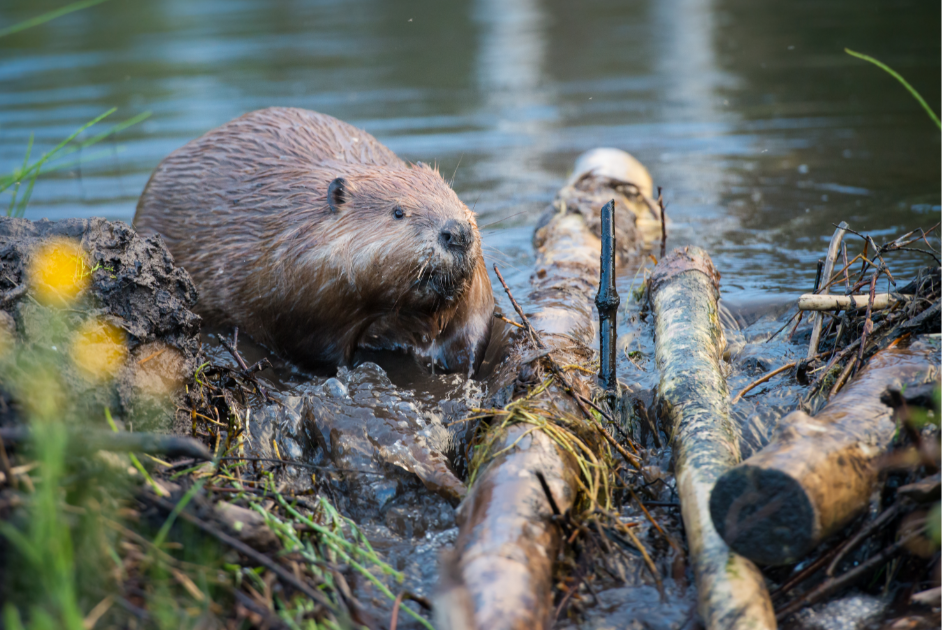Beavers were brought to the desert to save a dying river. Six years later, here are the results.
Their engineering feats are pretty dam incredible.
Can outsider beavers save this dried up river?
It's not easy being a river in the desert under the best of circumstances. The ecosystem exists in a very delicate balance, allowing water sources to thrive in the harsh conditions. These water sources in otherwise extremely dry areas are vital to the survival of unique wildlife, agriculture, and even tourism as they provide fresh drinking water for the people who live nearby.
But man-made problems like climate change, over-farming, and pollution have made a tough job even tougher in some areas. Rivers in Utah and Colorado part of the Colorado River Basin have been barely surviving the extremely harsh drought season. When the riverbeds get too dry, fish and other aquatic creatures die off and the wildfire risk increases dramatically.
About six years ago, one team of researchers had a fascinating idea to restore the health of some of Utah's most vulnerable rivers: Bring in the beavers.

In 2019, master's student Emma Doden and a team of researchers from Utah State University began a "translocation" project to bring displaced beavers to areas like Utah's Price River, in the hopes of bringing it back to life.
Why beavers? Well, it just makes dam sense! (Sorry.)
In all seriousness, beaver dams restrict the flow of water in some areas of a river, creating ponds and wetlands. In drought-stricken areas, fish and other wildlife can take refuge in the ponds while the rest of the river runs dry, thus riding out the danger until it rains again.
When beavers are present in a watershed, the benefits are unbelievable: Better water quality, healthier fish populations, better nutrient availability, and fewer or less severe wildfires.
It's why beavers have earned the title of "keystone species," or any animal that has a disproportionate impact on the ecosystem around them.

Doden and her team took beavers who were captured or removed from their original homes due to their being a "nuisance," interfering with infrastructure, or being endangered, and—after a short period of quarantine—were brought to the Price River.
Despite the research team's best efforts, not all the translocated beavers have survived or stayed put over the years. Some have trouble adapting to their new home and die off or are killed by predators, while others leave of their own accord.
But sine 2019, enough have stayed and built dams that the team is starting to see the results of the effort. In fact, beaver projects just like this one have been going on all over the state in recent years.
- YouTube youtu.be
The water levels in the river are now the healthiest they've been in years. The fish are thriving and Utah residents are overjoyed with the experiment's results.
According to an early 2025 column in The Salt Lake Tribune (i.e. six years after the beaver translocation began) the revitalization of the Price River has "helped save [our] Utah town."
"A tributary of the Colorado River, the Price River runs through downtown Helper," wrote column authors Lenise Peterman and Jordan Nielson. "On a warm day, you’re likely to find the river filled with tourists and locals kayaking, tubing and fishing along its shore. A decade ago, it was hard to imagine this scene—and the thriving recreation economy that comes with it—was possible."
Of course, it wasn't JUST the beavers. Other federal water cleanup investments helped remove debris, break down old and malfunctioning dams, and place tighter regulations on agriculture grazing in the area that depleted vital plant life.
But the experts know that the beavers, and their incredible engineering work, are the real MVPs.

In other drying, struggling rivers in the area, researchers are bringing in beavers and even creating manmade beaver dams. They're hoping that the critters will take over the job as the rivers get healthier.
Utah's San Rafael River, which is in bleak condition, is a prime candidate. In one area of the river, a natural flood inspired a host of beavers to return to the area and "riparian habitat along that stretch had increased by 230%, and it had the most diverse flow patterns of anywhere on the river," according to KUER.
It's hard to believe that beavers nearly went extinct during the heyday of the fur trapping industry, and continued to struggle as they were considered nuisances and pests. Now, they're getting the respect they deserve as engineer marvels, and their populations have rebounded due to better PR and conservation programs.
It's about dam time!
This article originally appeared in June.

